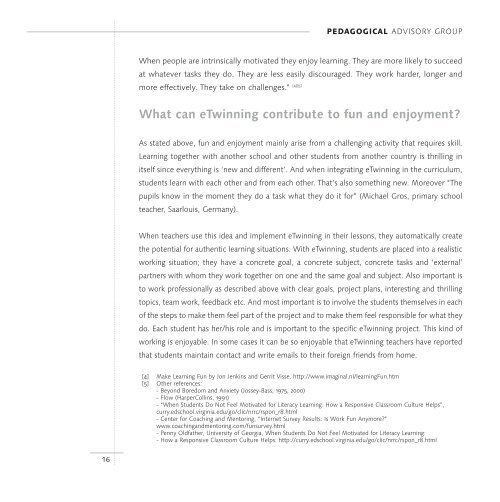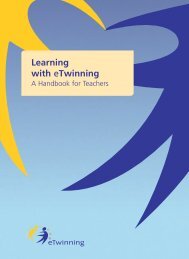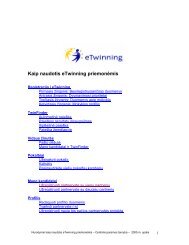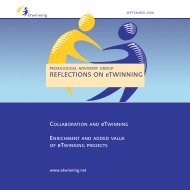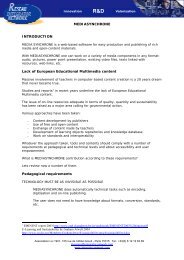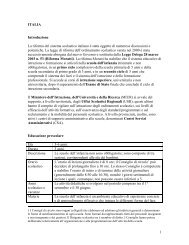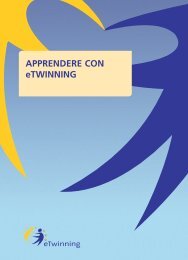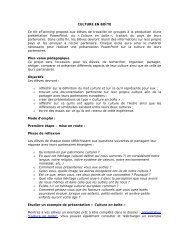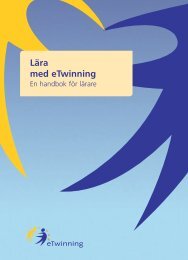REFLECTIONS ON eTWINNING
REFLECTIONS ON eTWINNING
REFLECTIONS ON eTWINNING
Create successful ePaper yourself
Turn your PDF publications into a flip-book with our unique Google optimized e-Paper software.
PEDAGOGICAL ADVISORY GROUP<br />
When people are intrinsically motivated they enjoy learning. They are more likely to succeed<br />
at whatever tasks they do. They are less easily discouraged. They work harder, longer and<br />
more effectively. They take on challenges.” [4][5]<br />
What can eTwinning contribute to fun and enjoyment<br />
As stated above, fun and enjoyment mainly arise from a challenging activity that requires skill.<br />
Learning together with another school and other students from another country is thrilling in<br />
itself since everything is ‘new and different’. And when integrating eTwinning in the curriculum,<br />
students learn with each other and from each other. That’s also something new. Moreover “The<br />
pupils know in the moment they do a task what they do it for” (Michael Gros, primary school<br />
teacher, Saarlouis, Germany).<br />
When teachers use this idea and implement eTwinning in their lessons, they automatically create<br />
the potential for authentic learning situations. With eTwinning, students are placed into a realistic<br />
working situation; they have a concrete goal, a concrete subject, concrete tasks and ‘external’<br />
partners with whom they work together on one and the same goal and subject. Also important is<br />
to work professionally as described above with clear goals, project plans, interesting and thrilling<br />
topics, team work, feedback etc. And most important is to involve the students themselves in each<br />
of the steps to make them feel part of the project and to make them feel responsible for what they<br />
do. Each student has her/his role and is important to the specific eTwinning project. This kind of<br />
working is enjoyable. In some cases it can be so enjoyable that eTwinning teachers have reported<br />
that students maintain contact and write emails to their foreign friends from home.<br />
[4] Make Learning Fun by Jon Jenkins and Gerrit Visse, http://www.imaginal.nl/learningFun.htm<br />
[5] Other references:<br />
- Beyond Boredom and Anxiety (Jossey-Bass, 1975, 2000)<br />
- Flow (HarperCollins, 1991)<br />
- “When Students Do Not Feel Motivated for Literacy Learning: How a Responsive Classroom Culture Helps”,<br />
curry.edschool.virginia.edu/go/clic/nrrc/rspon_r8.html<br />
- Center for Coaching and Mentoring, “Internet Survey Results: Is Work Fun Anymore”<br />
www.coachingandmentoring.com/funsurvey.html<br />
- Penny Oldfather, University of Georgia, When Students Do Not Feel Motivated for Literacy Learning:<br />
- How a Responsive Classroom Culture Helps: http://curry.edschool.virginia.edu/go/clic/nrrc/rspon_r8.html<br />
16


